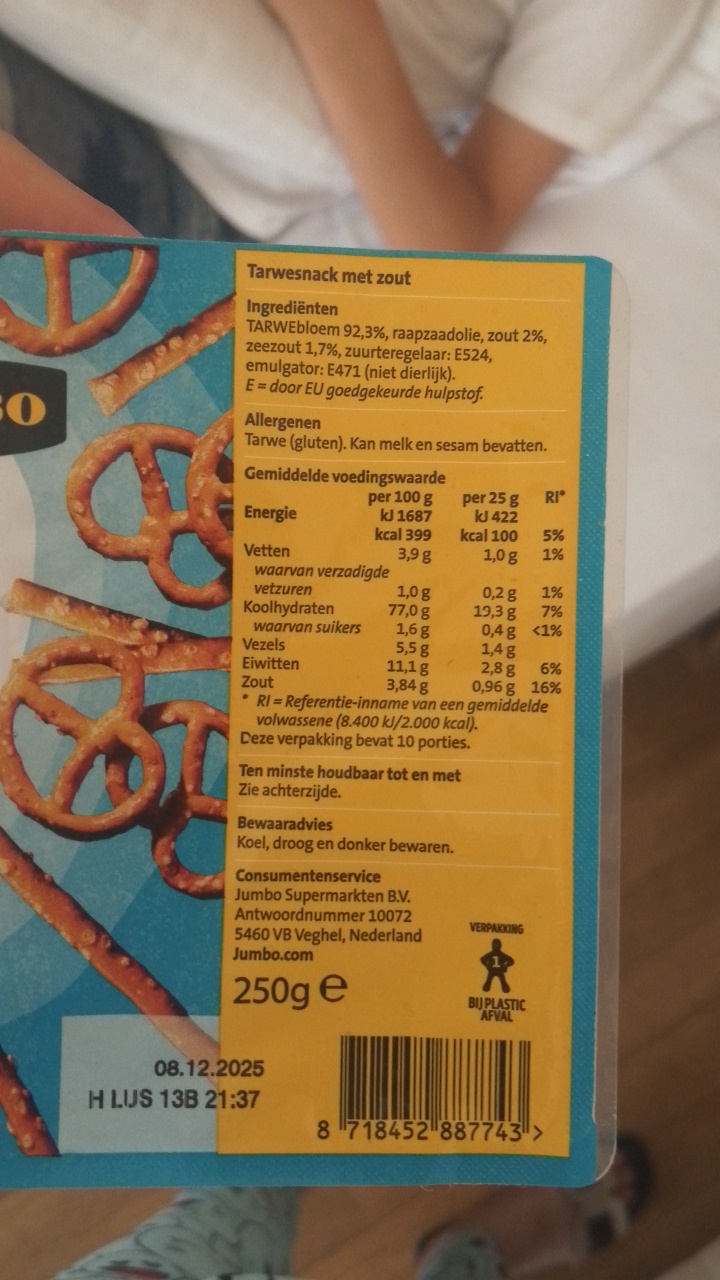
Barcode: 8718452887743
Tarwesnack met zout
HALAL
📝 Reason: The majority of the ingredients listed (wheat flour, rapeseed oil, salt, sea salt) are of plant or mineral origin and thus Halal. However, ‘zuurteregelaar’ and ’emulgator’ are generic terms covering a range of possible food additives that may come from either Halal, Haram, or Doubtful sources. Since the exact E-code or origin is not specified, these ingredients are classified as Doubtful in strict Halal compliance. According to Quran 5:3, Muslims are prohibited from consuming foods that are not clearly Halal. For compliance, all ambiguous ingredients must be individually verified before considering the product Halal. References: IFANCA, FoodChemAdditives.com.
🏷️ Category: Pretzel, Snack
📄 Certificates: Vegetarisch
Ingredients:
Details
Is Tarwesnack met zout Halal?
When it comes to snacking, many individuals, especially those following halal dietary laws, often wonder about the Halal status of various products. Today, we delve into the popular snack, Tarwesnack met zout. It’s essential to explore each ingredient and its classification to ensure it meets halal standards.
Halal Status Overview
The overall Halal status of Tarwesnack met zout is classified as HALAL. The composition primarily includes ingredients derived from plant or mineral sources, which align with Halal dietary regulations. However, some ingredients require a closer inspection based on their potential sources.
Ingredient Analysis
The ingredients for Tarwesnack met zout include:
- Tarwe bloem (Wheat flour)
- Raapzaadolie (Rapeseed oil)
- Zout (Salt)
- Zeezout (Sea salt)
- Zuurteregelaar (Acidity regulator)
- Emulgator (Emulsifier)
Ingredient Breakdown
Let’s evaluate the Halal status of each component:
1. Tarwe bloem (Wheat flour)
Wheat flour is derived from the grain of wheat and is considered Halal as there are no traces of haram processing associated with it. It’s accepted widely in halal dietary practices. Reference
2. Raapzaadolie (Rapeseed oil)
Rapeseed oil is plant-based and usually classified as Halal, provided it hasn’t been contaminated with animal fats. This is rare, making it a safe inclusion in halal diets. Reference
3. Zout (Salt)
Simple mineral salt is universally accepted as Halal. Its origin does not affect this classification. Reference
4. Zeezout (Sea salt)
Similar to table salt, sea salt is also derived from mineral sources and is widely regarded as Halal. Reference
5. Zuurteregelaar (Acidity regulator)
This ingredient is more complex as it refers to a range of additives, which can be either Halal or haram depending on their specific chemical structure and source. Commonly referenced E-codes within this category, such as E260, E330, and E500, can be Halal; however, without knowing the exact E-code used in this product, it is considered classified as Doubtful. Reference
6. Emulgator (Emulsifier)
Similar to the acidity regulator, emulsifiers such as E471 can be derived from both plant and animal sources. If the source isn’t indicated, this component is classified as Doubtful as well. Reference
Your Healthy Choice
For consumers wanting to make sure their snacks align with halal guidelines, it’s important to individually verify ingredients that are marked as Doubtful. Following Quran 5:3, Muslims should avoid anything not explicitly Halal. Despite the uncertainty surrounding the acidity regulator and emulsifier, the rest of the ingredients align well with Halal principles.
While Tarwesnack met zout is labeled as Halal overall, the ambiguity regarding certain additives prompts us to remind consumers to seek products with clear ingredient sources or certification when possible. This snack fits well into the category of Pretzels and Snacks, and though it currently lacks a Halal certification, it’s a vegetarian-approved treat, offering a savory choice for your next snack craving. Always consult informative sources, like Halal Food Consumers, for ongoing updates on ingredient classifications.
